As part of the celebration marking Black History/LGBT Month, I was interviewed by Tundun Adeyemo, presenter of the program ‘Outspoken’ 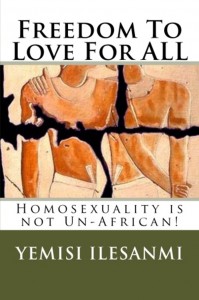 on www.africaukradio.com. Below is a text of the interview, also available on her blog.
on www.africaukradio.com. Below is a text of the interview, also available on her blog.
October is Black History/Lesbian Gays Bisexual Transsexual Month. In parts of London, people have been marking this in various ways. To help us give that some perspective is author Yemisi Ilesanmi who joins us from London to talk about her book and why homosexuality is not just an European concept.
Hello Yemisi, Many thanks for joining us.
1- You have written this book ‘Homosexuality is not unAfrican.’ Why did you write this book?
Thanks. I wrote this book to counter the erroneous impression that homosexuality is Un-African. This is a rhetoric that many African politicians keep sprouting in their bid to defend the discrimination against gays, lesbians, bisexuals, and Transsexuals. With the upsurge of anti-gay bills springing up in many African countries, it became imperative to provide necessary information and create awareness on the issues of sexual orientation especially homosexuality and bisexuality. Information is power and education is key to human development.
In this digital age, where information is easily accessible, it is sad to know that many people especially Africans still fall for the homophobic, biphobic and transphobiic rhetoric that sexual orientation is a matter of choice. In the book Freedom to Love For All; Homosexuality is not Un-African, I put together a collection of my essays debunking the myths that Homosexuality is Un-African.
First, I started by clarifying the meaning of sexual orientation and providing accepted definition of the different kinds of sexual orientation and gender identity that we have. The first three chapters delved into known history of homosexuality and bisexuality in Africa. Noteworthy is the wall paintings in ancient Egypt of two black men kissing. They were named khnumhotep and Niankhknum.
They were ancient Egyptian royal servants; they are believed to be the first recorded same-sex couples in history. It is the only tomb in the necropolis where men are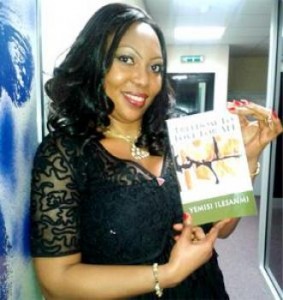 displayed embracing and holding hands. In addition, their names form a linguistic reference to their closeness. Niankhknum means joined to life and khnumhotep means joined to the blessed state of the dead, together the names can be translated as ‘Joined in life and joined in death’.
displayed embracing and holding hands. In addition, their names form a linguistic reference to their closeness. Niankhknum means joined to life and khnumhotep means joined to the blessed state of the dead, together the names can be translated as ‘Joined in life and joined in death’.
Also, there are other cultural practices in Africa that indicates not just the existence but acceptance of homosexuality, bisexuality and transsexuality in Africa.
For example, in Uganda some members of the Buganda royal family suggest that homosexuality was existent and tolerated before colonial rule. To this day, it is said that many members of the Buganda royal family are gay.
Also, until the practice died out in the early 20th century, male Azande warriors in the northern Congo routinely married male youths who functioned as temporary wives.
Matriarchy was and is still strong in Calabar, Nigeria. In the absence of a male child, the eldest daughter in the family is allowed to marry another woman and have children together to carry on the family name.
Some African cultures viewed transgender persons as gods. They were revered before imported, intolerant religions started making waves in Africa. It was the advent of colonisation and the import of foreign laws like sodomy law, which brought homophobia and intolerance into many African societies.
For example, Sango the Yoruba god of thunder was often described as a beautiful woman who dressed like a woman, had his hair braided and accessorised like a woman. Sango priests all men, still dress in clothing traditional associated with women when performing rituals. Homosexuality, bisexuality, and transsexuality are not concepts alien to Africa. Sexual orientation is not just a cultural thing; it is biological.
- It is 2014 and you would think most people are more accommodating? Is that your experience?
Sadly, that is not my experience in 2014 Africa. In civilised, western countries, the laws and people are tending towards tolerance, better understanding of diversity however, most African countries seem to be doing the opposite. Bills and laws criminalising gays, lesbians, bisexuals, and transexual are now the order of the day.
Homophobia is celebrated as a godly thing. Since when is oppressing your fellow human being a thing to celebrate, especially when the person does not pose any threat to you or the society.
I do hope with the right information, education, and awareness, we will overcome this tide of hate that Africans are projecting towards lgbts. As you said, it is 2014; human relations should be getting better not worse.
- In your book, a lot of Nigerians have very myopic views to homosexuality. Could our generation change things?
I believe every generation has a responsibility to leave the world a better place than we met it.
The generations before us fought slavery, fought for the right to be treated as full members of the human society, women got the right to vote, inter-racial marriage was 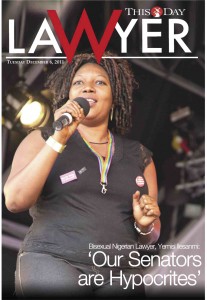 decriminalised and accepted as a normal thing, this generation is a beneficiary of the dividends of these civil rights movements struggles. It therefore behoves on this generation to fight the good fight for equal right for lesbians, gays, bisexuals, and transsexuals.
decriminalised and accepted as a normal thing, this generation is a beneficiary of the dividends of these civil rights movements struggles. It therefore behoves on this generation to fight the good fight for equal right for lesbians, gays, bisexuals, and transsexuals.
We hold in our power to effect a positive change and I know we can. We have access to information; we just have to let go of our myopic views and embrace rationality. Learn to love not germinate or spread hate.
- What annoys me is the hypocrisy with which Nigerian leaders deal with homosexuality. Are they capable of rational thought?
Unfortunately, rational thought and Nigerian leaders do not belong in the same sentence. Corruption, hypocrisy, boko haram, stolen funds, bad infrastructures, bad governance are words that belong in the same sentence with Nigerian leaders.
However, as the saying goes, every follower deserves the kind of leadership they get. Maybe Nigerians deserves their leaders after all the leadership is a reflection of the followership.
I do hope there will be a positive change in the mind-set of Nigerians. The kind of change that would embrace rational thought, logic and tolerance. It is difficult but it is not impossible.
- What is life like for people who are victims of homophobia? What more can we do to highlight the fact that my sexuality is not your business?
Victims of homophobia, biphobia and transphobia are not allowed to be who they are because of the oppression, and discrimination, hostility expressed towards gays in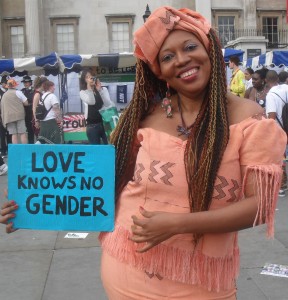 Nigeria.
Nigeria.
Gays can lose their life due to homophobia. Public humiliation and lynching are possibilities Lesbians, gays, bisexuals and trans people face. 14 years imprisonment for same sex couples is now law in Nigeria. Many are ostracised by family members and friends, loss of economic income, and loss of human rights are some of the injustice gays, lesbians, and bisexuals face in Nigeria and many African countries.
The law must highlight the fact that every Nigerian is entitled to inalienable human rights. The constitution asserts this, and laws that contradict the spirit and words of the constitutions should not be passed and if passed, the judiciary should step up and pronounce such laws null and void.
What consenting adults do on the privacy of their rooms is not the business of the law. Nigerians should stop poke nosing into the bedrooms of their neighbours. Gays, lesbians and bisexuals have the right to engage in same-sex relationships just as heterosexuals have the right to engage in opposite sex relationships. It is their right. My right, my body, my choice, not your business. As long as I am not forcing you to have a relationship with me, you should mind your own business and keep out of my lovelife and sex life.
- Homophobia is a crime in the UK isn’t it? Why do you still work so hard on the message? Are people not getting it?
It is a good thing that homophobia is a crime in most developed countries now, including UK. However, there are still instances of homophobia especially within the 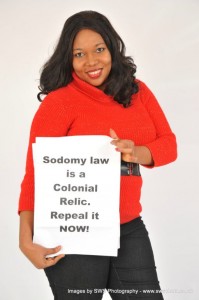 black community.
black community.
Many Nigerians living in UK are still homophobic, they might not express it openly for fear of the law, but that does not mean they are tolerant towards their fellow Nigerians or even family members who come out as gay, lesbian, bisexual or trans.
Also, we are unfortunately witnessing some European countries like Russia retrogressing in terms of securing LGBT rights for their citizens.
Therefore, we need to keep talking and working to make sure that the few rights that have been gained for and by LGBT people are not just taken away overnight. In addition, we need to build on these rights.
Also, we need to keep talking and working to secure LGBT rights in Africa, especially those of us who can do the work from a safe-place like UK. We need to put a face to the many faceless persecuted African LGBTs.
We also must give a voice to the many silenced African LGBTs. We must use our safe-space to secure safety, rights, tolerance, and acceptance for our fellow African LGBTs. So the work must continue because an injury to one is an injury to all.
- You have a very clear message to people who think and say homosexuality is unAFRICAN….. is there a reason why you are passionate about this?
I am passionate about LGBT rights because first, I am an ardent believer in inalienable human rights and I believe every human being regardless of race, sex, gender or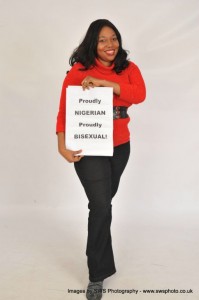 sexual orientation deserves to enjoy their inalienable human rights.
sexual orientation deserves to enjoy their inalienable human rights.
I am also bisexual, which makes me a target of the anti-lgbt law.
However, I believe fighting for equality and justice should be the responsibility of every decent and rational thinking human being , regardless of whether they are affected by atrocious laws or not. We should all be passionate about defending human rights for all.
- If you had a message for governments in Africa who have penalised homosexuality, what would it be?
My message to African leaders who have penalised or thinking of penalising same-sex relationships is that they should pick up a science book and read, read, read! Homosexuality is not a choice, just as heterosexuality is not a choice.
Homosexuality is not harmful to anyone, just like heterosexuality is not harmful to anyone. Homosexuality is not a western thing; it is a human thing. Unless you want to claim Africans are not part of the human race, you do not have any reason at all to criminalise homosexuality, bisexuality, or transsexuality.
In addition, even if homosexuality is a choice, consensual adult have the right to engage in consensual sexual and emotional relationships. What consenting adults do in the privacy of their bedrooms is not the business of the law.
Above all, African governments should concentrate on ridding the continent of corruption, poverty, and bad leadership. Homosexuality is not the problem of starving Africans; homosexuality is not a problem at all. Let African leaders think of ways to rejuvenate the economy of the continent and stay out of the bedrooms of Africans.
- Could you ever live anywhere in Africa? Is there a link between homosexuality and atheism?
I am an African and a Nigerian, but home is where you feel safe. Unfortunately, with many African countries passing homophobic laws, I do not feel safe in some African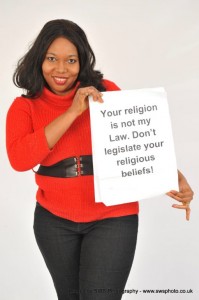 countries including Nigeria. However, I will continue to fight for my right not to be discriminated against in my own country.
countries including Nigeria. However, I will continue to fight for my right not to be discriminated against in my own country.
Nigerian lesbians and gays deserve the same rights every other Nigerians citizens enjoy and that include the right to life, right to privacy and right to freedom of association, freedom of expression and the right to marry another consenting adult.
There is no link between homosexuality and atheism, but there is a link between rationally accepting the evidence that homosexuality is natural, and the way atheism is about logic, rational argument, and evidence. It is foolhardy to continue to criminalise homosexuality when all rational evidence points to the fact that it is natural, not a choice, and not harmful to anyone.
10. Where can our listeners find your book? And perhaps more information about what you do.
My book ‘Freedom To Love For All; Homosexuality is not Un-African‘ is available in paperback and kindle edition on Amazon. My collection of poems titled ‘Reaching for the Stars’ will soon be available on Amazon. It is about empowerment, self-actualisation, culture, human rights, and feminism, tapping into our inner hero and reaching for the stars. So watch this space.
Thank you very much.


Since when is human rights not about culture?
The very concept of human rights (that apply equally to everybody) is peculiar to one particular culture.